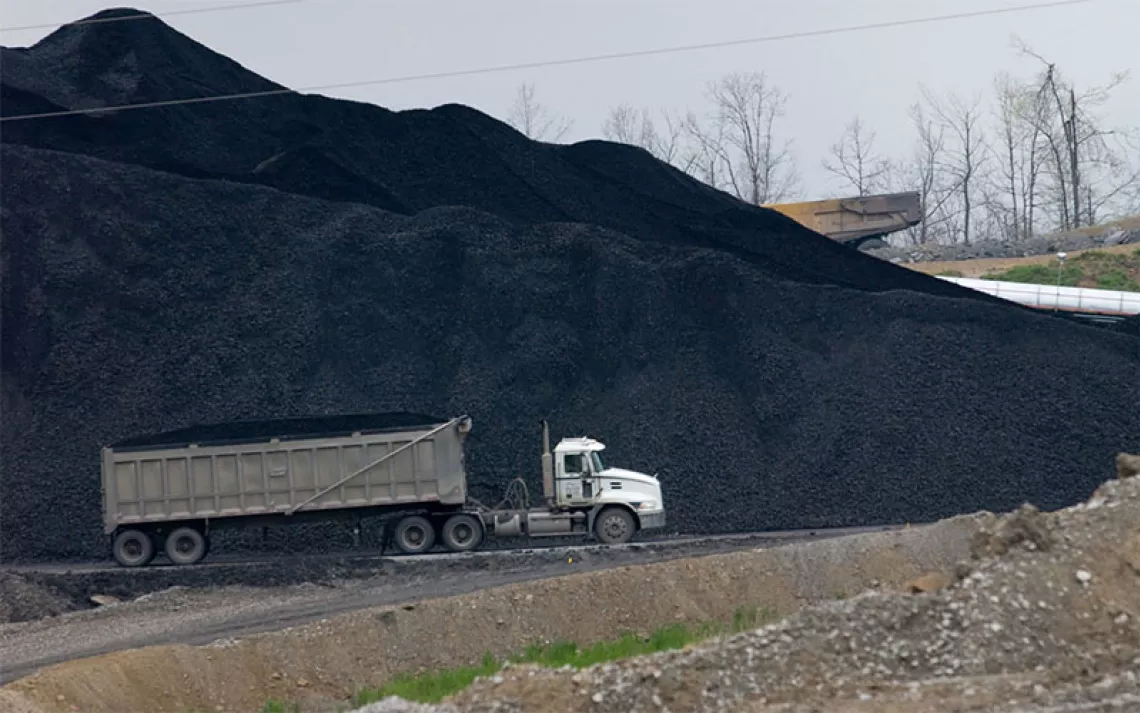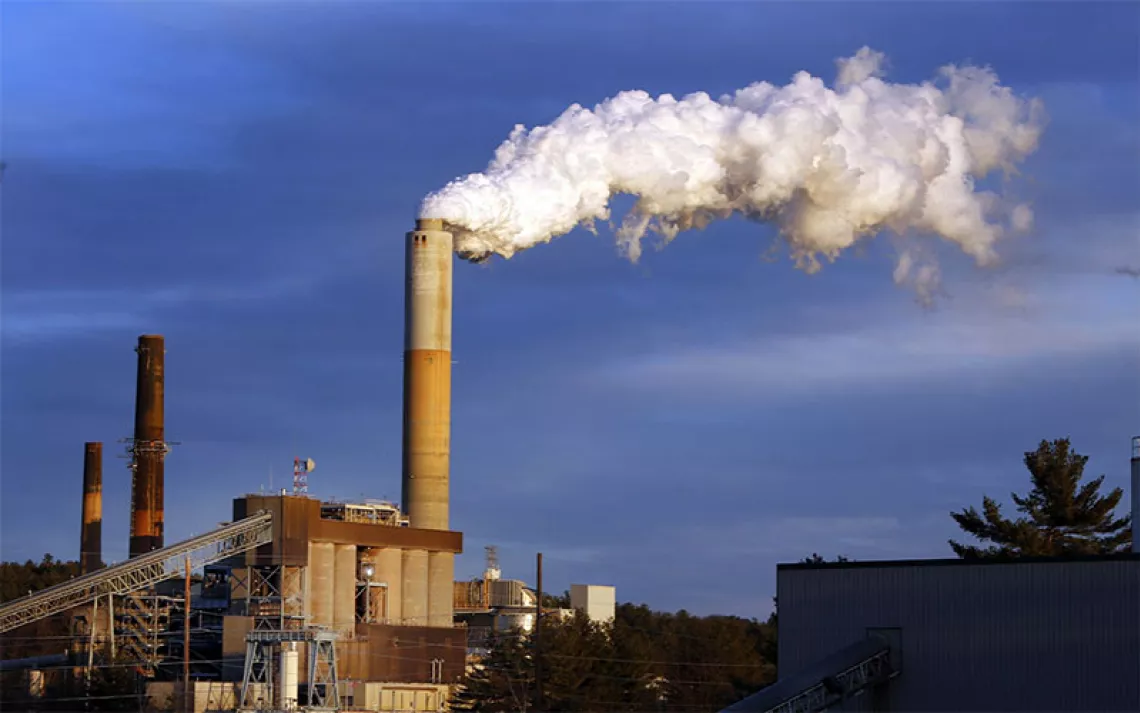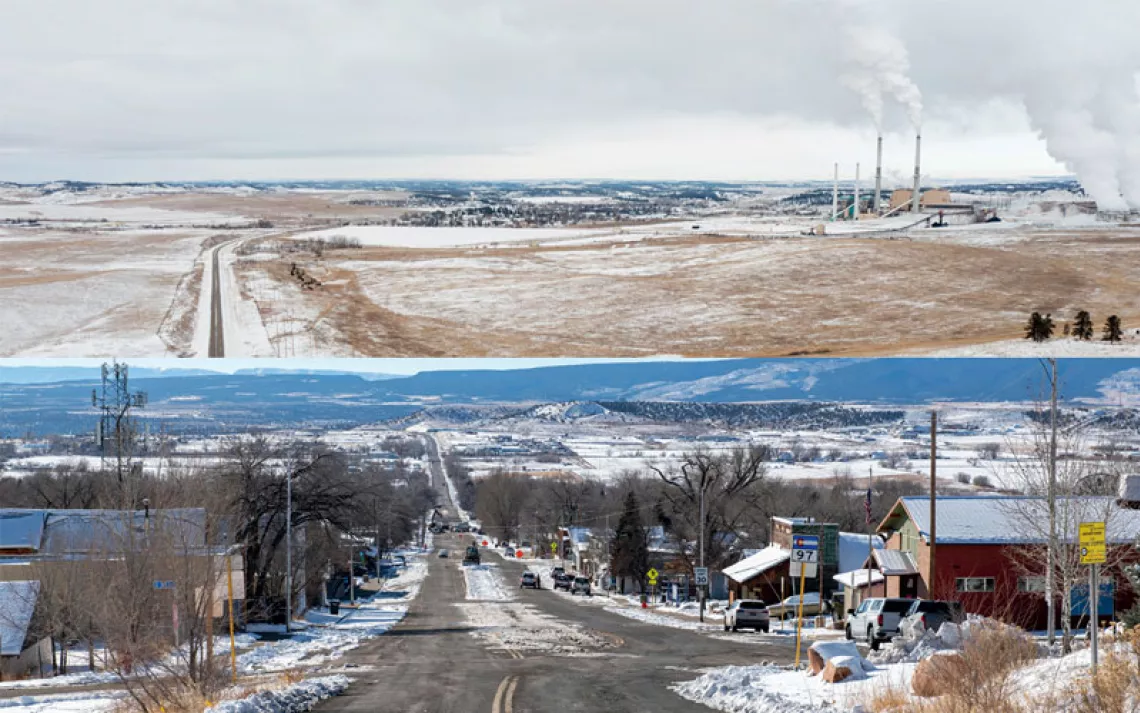In Turkey, a Battle Over Coal Draws a Line in the Soot
Residents of Afsin-Elbistan fight against coal-fired power plants
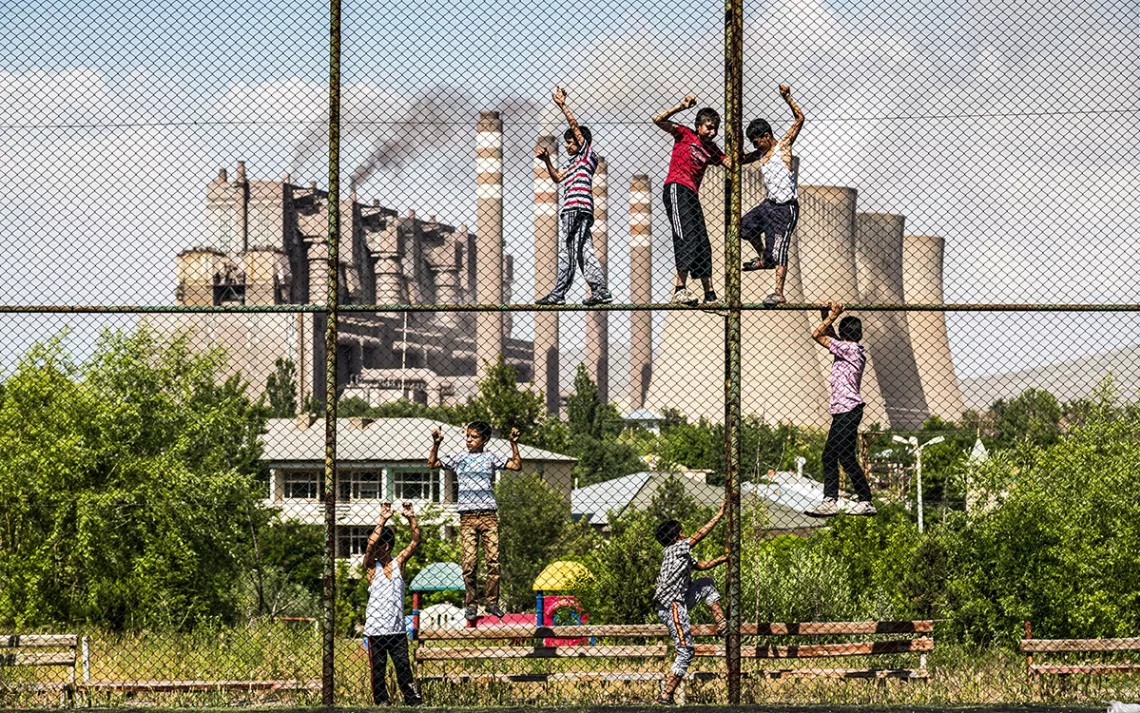
Photos by Kerem Yucel
For generations, residents of Turkey’s southeastern region of Afsin-Elbistan carried on with their traditional lives, working the fields in one of the country’s largest and most fertile flatlands. That lifestyle came to an end in the 1980s, when state-initiated efforts to extract coal and build under-regulated coal plants forced many locals there into exile.
The area, once an oasis of farming with a lively social scene, turned into a ghost town. The signposts of an old movie theater and the now-quiet marketplace remain as the remnants of a bygone era. “This whole region has died,” said Kadir Sonmez, an elected representative of the community of Cogulhan, whose population has been steadily declining for three decades. “In my opinion, this place is no longer inhabitable. Nonetheless, we go on living here—if you can call it that.” He continued, “I have been striving to get this neighborhood relocated for nearly a decade now. I have been explaining our plight everywhere. I even went to the capital, but to no avail.”
Besieged by two massive coal-fired power plants as well as a coal mine, everyone who had the opportunity to leave has already left, Sonmez added. Astonishingly enough, there are plans to build six additional plants in the Afsin-Elbistan region, an area that is home to around 30 percent of Turkey’s lignite coal reserves. Those plans have made Turkey second only to China in terms of its coal-fired plant capacity in preconstruction development.
The decision to make large-scale investments in coal amid the climate crisis is a puzzling one, especially since research demonstrates the need to reduce coal power by 80 percent globally within the next decade. The Turkish government justifies the move as part of a strategy for greater energy independence. During the past decade, economic growth triggered a rise in Turkey’s electricity consumption, leading demand to increase by some 4.3 percent annually. Without sufficient energy resources of its own, the country has grown increasingly dependent on Russian gas, which both triggered a widening current account deficit and increased its geopolitical vulnerability.
In response to the proposed expansion of coal-fired power, a growing number of people in the Afsin-Elbistan region and across Turkey are demanding that the country’s leaders turn away from the dirty fuel. The tide may be turning as a stronger civil society—both at the national and grassroots levels—is emerging as a force to combat coal.
The first plant to have been built in the region, Afsin-Elbistan A, towers over the landscape and is situated merely 500 yards away from Cogulhan. Its four giant cooling towers dwarf an equal number of chimneys, which have been throwing up ash, dust, and toxic chemicals while operating without a filter system since the plant's construction in the mid-1980s. An open conveyor belt cuts across the neighborhood, carrying the coal to be burned and then sent back to the neighborhood’s skies in the form of ashy, black soot.
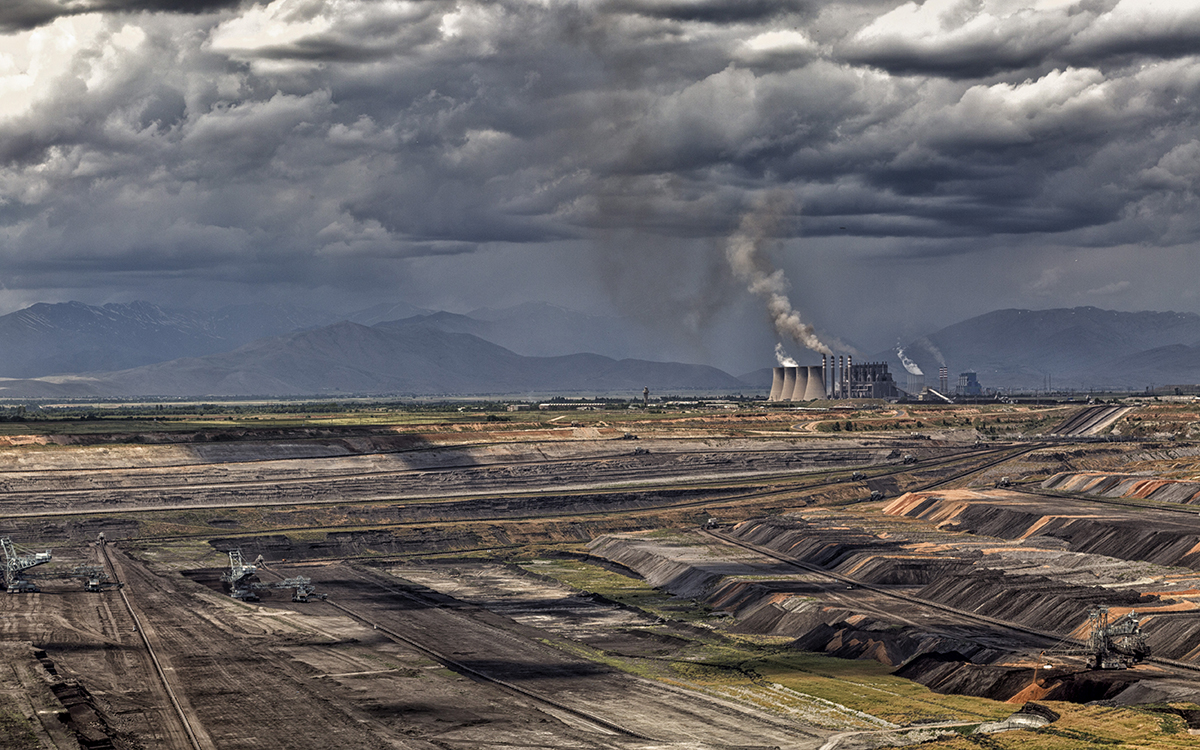
The ash is the most easily recognizable public health and environmental threat, and it is what the public complains most ardently about. Locals bitterly describe the cold winter days when snow turns dark even before touching the ground. It has become a mundane task to wash cars with vinegar in order to remove the clingy black dust that forms like a second layer of paint. Residents can no longer hang out their laundry on their balconies to dry. The age-old tradition of laying out tarhana—a granulated blend of dried vegetables used like instant soup—has become unthinkable.
Cogulhan residents are also acutely aware of the more insidious and deadly consequences of the pollution, as more and more family members, friends and neighbors get sick or lose their lives. In 2018, the residents of Kahramanmaras province, where Afsin-Elbistan is located, inhaled Turkey’s most polluted air. The region’s air quality has been on a downward slope for years, with PM10 levels (particulate matter) four times higher than the World Health Organization’s recommended limit and twice as high as Turkey’s own regulatory thresholds.
According to a report by the Right to Clean Air Platform, a Turkish public health organization, the number of Afsin-Elbistan residents who sought cancer treatment in the nation’s capital, Ankara, increased eightfold in the decade following the first plant’s construction, to an average of 80 people each year. It is estimated that the existing two plants have so far caused 17,000 premature deaths triggered by exposure to high levels of PM2.5 and nitrogen dioxide.
Onur Akgul, the Climate and Energy Project Head of Greenpeace Mediterranean, warned that this figure will climb further if the planned coal plants are realized. “Research suggests the figure will rise to around 32,000 by the end of the new projects’ life cycle,” Akgul said, adding that the calculations were made on the assumption that Afsin-Elbistan A will soon retire. However, considering the plant was privatized in 2019, this appears to be an overly optimistic scenario.
While all coal-fired power plants are hazardous to public health, plants that burn lignite—a softer form of coal with a much lower energy intensity—is especially so. Compared with hard coal, three times as much lignite has to be burned in order to generate an equal amount of electricity, causing Afsin-Elbistan plants to emit three times as much pollution per megawatt.
Unfortunately, the locals’ complaints about the first plant fell on deaf ears. The state-owned Electricity Generation Company constructed a second, larger power plant in 2004—Afsin-Elbistan B—which is located some 2.5 miles northwest of Cogulhan. The newer plant has also proven problematic as its filtration system, which is unsuited to Afsin-Elbistan’s low-quality lignite, has been malfunctioning each time the coal falls below a certain calorific value of energy intensity.
With all that has gone wrong, plans for a third plant are nonetheless on track. In March, Turkey’s Ministry of Environment and Urban Planning approved a positive environmental impact assessment for Afsin-Elbistan C, which will have a capacity of 1,800 megawatts. Environmental and public health groups harshly criticized the assessment, arguing that it contained problematic remarks, going as far as describing coal as a clean form of energy. “Coal is used around the world without polluting the environment,” the assessment said.
Facilitating coal investments through easing the environmental review processes has a history in Turkey. A 2015 study revealed that out of the more than 40 coal projects approved between 1999 and 2015, none was ever given a negative environmental assessment.
Now, grassroots and national civil society groups are trying to prevent additional coal plant construction. Their strength became evident toward the end of 2019, when a successful anti-coal campaign delivered a rare win. In November 2019, a bill was introduced to Turkey’s parliament to extend a six-year grace period during which some 15 coal-fired power plants were supposed to finalize necessary environmental investments. The motion proposed postponing the January 2020 deadline until June 2022. The proposal triggered a public backlash, especially among the residents of coal towns who have been coping with the negative impacts of under-regulated plants.
“The hashtag #temizhavahaktir [Turkish for ‘clean air is a right’] was shared nearly a million times on social media,” said Buket Atli, a coordinator at the Right to Clean Air Platform. “People who lived in close proximity to the power plants sent photos of the unfiltered chimneys to the group deputy chairpersons of every political party. Around 100,000 signatures were collected against the bill.”
Eventually, in an uncommon move, President Recep Tayyip Erdogan went on to veto the bill, triggering a process that led five of the 15 plants to cease operations, including Afsin-Elbistan A. All four units of the plant remained closed for six months until two units were granted temporary operating permits in June. Meanwhile, the operations at Afsin-Elbistan B continued without interruption after it received a six-month temporary operating permit.
Among the civil society organizations leading this battle was a relatively recent local initiative called the Platform to Protect Life and Nature. Ibrahim Yalcin, one of the founders of the platform, said the idea to organize coal resistance was born in his village of Kucukyapalak after Anadolu Enerji, a private energy company, set out to build an 800 MW coal plant.
“According to the plan, the coal plant will be only half a mile from our village, whereas the ash storage site will be merely 300 yards away,” Yalcin said, adding that the project will destroy some 20 square miles of agricultural lands in one of Turkey’s most productive farming areas.
The platform is waging legal battles on two fronts, against both Anadolu Enerji and a second private company called Diler Enerji, which is trying to build a 400 MW plant near the small village of Akbayir. The campaign has witnessed victories on both fronts, as a court halted one plant and stalled another.
“It is clear that most of the planned coal-fired power plants are not being constructed,” said Baran Bozoglu, chairperson of Turkey’s Chamber of Environmental Engineers. He says that only 1.5 GW of the 31.7 GW of planned coal-power capacity is currently being built. “While rising costs have a role in this, the slowdown is also related to the reactions of international banks in the face of the climate crisis.”
Notwithstanding declining international investments in coal, the Turkish government continues to provide sizable financial support to coal projects, even though the returns are increasingly slim. According to a study by the Overseas Development Institute, Turkey provided around $USD 276 million of fiscal support to coal production in 2016–2017, as well as some $347 million of annual subsidies for poor households. These forms of direct support are compounded by exemptions from environmental regulations, guaranteed price and purchase of electricity for predetermined periods of time, and support in research and development expenditures.
Despite this degree of support, the country’s energy industry is experiencing a loan repayment crisis that puts national banks at risk. A recent report by PwC Turkey says that there are $12.8 billion in unpaid foreign currency loans with high risk of default in Turkey, the highest portion of which—some $5 billion—are owed by seven coal-fired power plants.
Under the circumstances, it is startling that Turkey largely disregards its rich resources of clean energy. In 2018, less than 10 percent of its electricity was generated from wind and solar, with the latter lagging far behind at only 2.6 percent. According to Sevil Acar, a professor at Bosphorus University, the main reason for Turkey’s underutilization of solar has been its relatively high cost of energy. “One way of achieving a leap [in solar] could be locally developing the technology,” Acar said. She underlined the necessity of reducing bureaucratic red tape, providing R&D support, and ensuring greater long-term clarity. She also warned that state support for coal investments greatly inhibits the growth of renewables and said that “the ongoing subsidies and support mechanisms tilt the market balance in favor of fossil fuels.”
In a map that depicts the solar potential of Turkey’s regions, the northern, colder areas are colored icy blue and mint green. Moving south, the tone evolves into canary yellow and gets warmer still, until it reaches a shade of radiant red in the Kahramanmaraş province. As the world moves away from coal to cleaner forms of energy, and as Turkish communities wage ever more effective battles against coal, it may be possible to imagine a future where the town of Cogulhan is characterized by another color: the bright shade of solar energy potential, as opposed to its familiar ashy black.
 The Magazine of The Sierra Club
The Magazine of The Sierra Club

